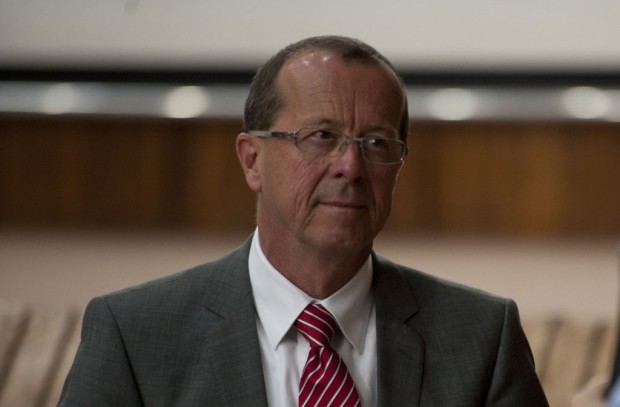Martin Kobler: We are short of time to address ISIS’s expansion in Libya

The U.N. envoy to Libya is urging its parliament to endorse a unity government that can help combat a mushrooming Islamic State affiliate, he told The Associated Press on Wednesday, the fifth anniversary of the uprising that toppled Moammar Gadhafi and plunged the country into chaos.
“Every day lost in political dialogue is a day of gain of Daesh,” Martin Kobler said in the interview, referring to the extremist group by its Arabic acronym. “There is chaos. There is anarchy in which Daesh expands.”
Libya’s internationally recognized government and parliament has convened in the far east since 2014, when Islamist-allied militias seized the capital, Tripoli, in support of rival authorities. The two competing parliaments are each backed by a loose array of militias and tribes.
The divisions have allowed IS to expand across the northern coast of the oil-rich North African country, which is just across the Mediterranean from Italy and has also become a major conduit for African migrants heading to Europe. IS controls the central city of Sirte and a number of oil installations, and has carried out attacks across the country.
President Barack Obama said Wednesday that the United States will continue to target IS in Libya after a raid last year killed a top commander.
But defeating the group will require a government with broad legitimacy and a unified army, and the international community can only lift an arms embargo once a unity government is in place.
On Sunday, a U.N.-designated council presented a new 18-member Cabinet in the Moroccan city of Skhirat, weeks after the internationally-backed House of Representatives rejected an earlier lineup, citing reservations about its size and the distribution of portfolios among the country’s three regions. Powerful factions in Tripoli have also rejected the unity government, raising concerns about whether it would be able to meet in the capital.
Kobler hailed the new proposal, describing it as a “balanced list” and saying politicians should accept the deal so they can begin to address the country’s “disastrous” humanitarian situation.
Around 2.4 million Libyans — out of a population of 6 million— depend on humanitarian aid, with 1.3 million receiving food aid, Kobler said. He said people line up in front of bakeries and bring their own medicines to hospitals hit by shortages. Oil production has dropped from 1.6 million barrels a day to 350,000, and Central Bank reserves are dwindling.
“Ninety-five percent of the Libyan people are behind the political deal and want to see a strong government that takes care of basic necessities,” Kobler said.
Libyans wanted far more when they took to the streets five years ago.
Inspired by the Arab Spring uprisings sweeping the region, Libyans rose up against Gadhafi, who launched a fierce military crackdown in response. As his tanks closed in on the rebel-held eastern city of Benghazi, NATO launched an air campaign to drive them back. The rebels captured and killed Gadhafi in October of that year, ending his four-decade rule.
Libya held its first-ever democratic election the following year, but the real power was held by an array of militias, including former rebel brigades, local tribes and Islamic militant groups. A dispute between rival political factions turned bloody in 2014, leading to the current impasse. Many have blamed the chaos on the U.S. and NATO, saying they abandoned Libya after helping to topple Gadhafi.
“We are going to repair it, and it is not too late,” Kobler said.
He said members of the U.N. Security Council have discussed imposing international sanctions on those who would play spoiler to the peace deal.
Once there is a legitimate government in Tripoli, it could request a foreign intervention against IS, but the war against the extremists must be a “Libyan fight,” he said.
When asked about possibility of failure, Kobler said: “I don’t answer that question.”
How to submit an Op-Ed: Libyan Express accepts opinion articles on a wide range of topics. Submissions may be sent to oped@libyanexpress.com. Please include ‘Op-Ed’ in the subject line.
- Aguila, Turkish Envoy Discuss Cooperation - January 14, 2025
- Sahara Bank Officials Jailed in 53m Dinar Credit Fraud - January 14, 2025
- Oil platform runs aground off northern Tunisian coast - January 14, 2025


